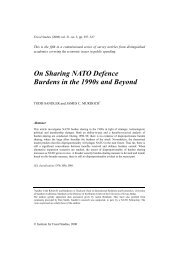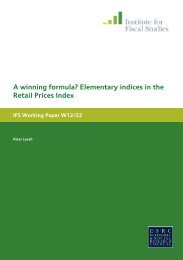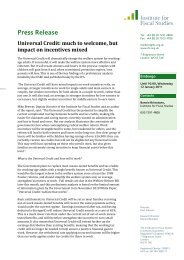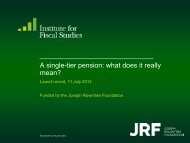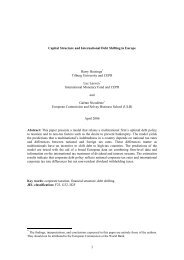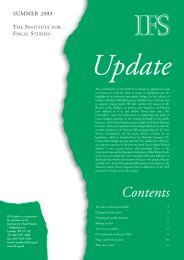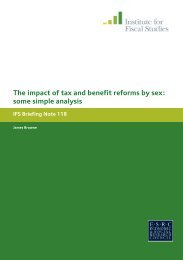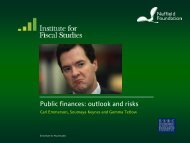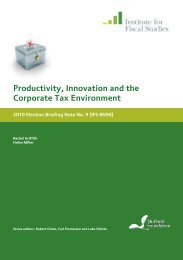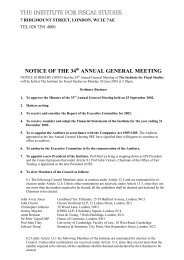A single-tier pension: what does it really mean? - The Institute For ...
A single-tier pension: what does it really mean? - The Institute For ...
A single-tier pension: what does it really mean? - The Institute For ...
Create successful ePaper yourself
Turn your PDF publications into a flip-book with our unique Google optimized e-Paper software.
Executive Summary<br />
A significant reform of the UK’s state <strong>pension</strong> system is currently being enacted.<br />
From 2016–17, the basic state <strong>pension</strong> and state second <strong>pension</strong> will be replaced<br />
by a new <strong>single</strong>-<strong>tier</strong> <strong>pension</strong> for everyone below the state <strong>pension</strong> age (SPA). This<br />
will bring an end to earnings-related state <strong>pension</strong> accrual in the UK. This marks<br />
the latest step on a long, tortuous and rather circular journey – a journey that<br />
started in the early 1970s w<strong>it</strong>h a basic state <strong>pension</strong> worth about £145 a week (in<br />
current earnings terms) and that has finally ended up in much the same place.<br />
<strong>The</strong> major difference between the 1974 system and the proposed new system is<br />
that the new system will be essentially universal, w<strong>it</strong>h considerably more<br />
extensive cred<strong>it</strong>ing of unpaid activ<strong>it</strong>ies than was available in 1974.<br />
Short-run effect of the proposed reform<br />
We have been able to use a unique data set combining lifetime National<br />
Insurance contribution histories w<strong>it</strong>h detailed micro data from the English<br />
Long<strong>it</strong>udinal Study of Ageing to look at who will benef<strong>it</strong> from these reforms<br />
among the first generations of those reaching SPA from 2016. Of those living in<br />
England who will h<strong>it</strong> state <strong>pension</strong> age between 6 April 2016 and 5 April 2020,<br />
we estimate that:<br />
• 18% of individuals (6% of men and 44% of women) would gain from the<br />
retrospective cred<strong>it</strong>ing of activ<strong>it</strong>ies that, at the time, only gave ent<strong>it</strong>lement to<br />
the basic state <strong>pension</strong> or to a low level of SERPS. This includes periods of<br />
self-employment, and periods of caring activ<strong>it</strong>ies, childcare or low earnings<br />
before 2002.<br />
• Overall, 35% of men and 61% of women (43% of individuals) would see their<br />
<strong>pension</strong> income at SPA increased as a result of the proposed reform. Many of<br />
these individuals will be benef<strong>it</strong>ing from the abil<strong>it</strong>y to ‘work off’ previous<br />
periods of contracting out.<br />
• 19% of individuals (21% of men and 14% of women) will find that the<br />
income they can expect at the state <strong>pension</strong> age under the proposed system is<br />
lower than they could have achieved under the current system.<br />
• <strong>The</strong> average change in <strong>pension</strong> income at SPA across all individuals is an<br />
increase of £2.74; 7% of men and 26% of women would see an increase of at<br />
least £10 per week.<br />
• Gains are largest among those who have spent periods out of the labour<br />
market caring for children and those who have had long periods of selfemployment.<br />
<strong>The</strong> average gain among women is £5.23 per week; the average<br />
gain among those who have had more than 10 years in self-employment is<br />
£7.51 per week.<br />
• Taking into account the more generous indexation of the state <strong>pension</strong> in<br />
retirement under the proposed system, 98% of individuals would benef<strong>it</strong><br />
1<br />
© Inst<strong>it</strong>ute for Fiscal Studies



